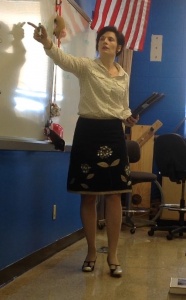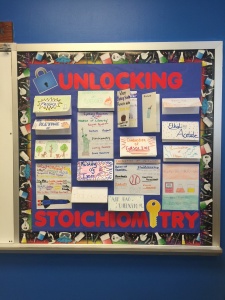Student teachers at Ball State University are required to complete an in-depth unit long data driven analysis of their student teaching called Learning Assessment Model Project (LAMP). I chose to run the project during the stoichiometry unit. Stoichiometry is a unifying topic of chemistry. It synthesizes previously taught topics of writing chemical formulas, calculating molar masses, performing molar conversions, and balancing chemical reaction equations so that students may apply prior knowledge to its fullest use. Stoichiometry is rigorous and challenging for students. My aim was to make this topic both accessible and useful for my students by relating it to their everyday lives. We chose the stoichiometry unit to run our LAMP project in as most students, except possibly those who have taken integrated chemistry and physics, have no experience with stoichiometry. We wanted to see the direct impact that our teaching had upon students. The following is a summary of the project, its outcome and conclusions drawn from it.

